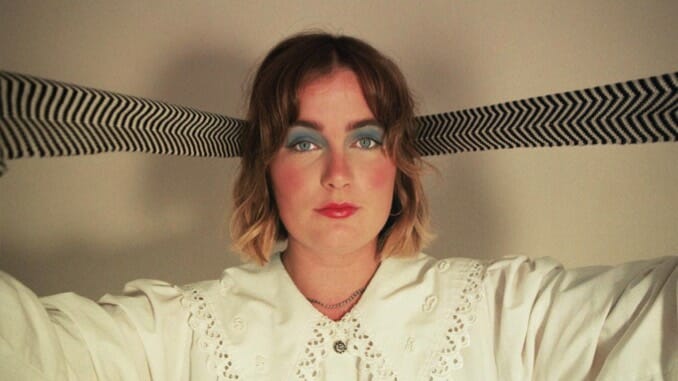Katy J Pearson Defines Success for Herself on Sound of the Morning
Photo by H. Hawkline
In her late teens, Gloucestershire-bred artist Katy J Pearson seemed to have it all. Ardyn, the pop duo she’d quietly formed with her co-vocalist brother Rob, had inked a coveted recording contract through Universal, who promptly flew the kids to Los Angeles for exotic songwriting sessions with top-tier tunesmiths like Semisonic’s Dan Wilson and Miike Snow’s Andrew Wyatt. To maintain momentum, Ardyn even moved to more bustling Bristol for new inspiration. Stardom seemed to be right around the corner. What could possibly go wrong?
Pretty much everything, sighs Pearson, who by 21 had lost it all and returned to Bristol alone, not knowing a single soul in town with whom she could commiserate. First, upon arriving from L.A., she’d been reprimanded by her hit-hungry label for not coming up with a suitably chart-friendly hit. The siblings’ experimental edge and unique familial harmonies that got them signed were apparently no longer enough, leading to a tacit company edict that any future scheduled collaborations were to be terminated, posthaste, if they detoured from pop parameters. “I was kind of pushed around by people that were older than me, and I felt like I had to give in to them,” recalls Pearson of the confidence-shattering experience, which ended in her begging to be dropped from the imprint. At the time, outsiders thought she was crazy for walking away from such an in-demand deal. “But now I think it’s all about really putting your foot down and saying no when something doesn’t feel right. It’s about staying true to yourself and the things that you believe in.” Ardyn was officially over before it began, and Rob—who had contracted glandular fever—moved back in with their folks. Alone in a strange new metropolis, his sister was a true innocent abroad. It took her a while to find her aesthetic footing.
But sure enough, two years ago, a wiser, reinvigorated Pearson, then 24, finally re-emerged with her first inventive solo album, the aptly dubbed Return, which swirled together folk-jangled acoustic guitar, synth-looped percussion and an unexpected vocal trill that felt almost Country & Western in tone. Her brother, upon his recovery, moved in with her in Bristol, and contributed guitar to her sessions, which produced the surprise smash “Take Back the Radio.” Ironically, the track clicked just as the pandemic lockdown shut down her scheduled introductory world tour. More bad luck. But the unflappable Pearson took it in stride, playing a handful of U.K. gigs and eventually making her first visit to America with a showcase at Austin’s South By Southwest festival earlier this year. Having settled comfortably into a now-booming Bristol music scene, and brimming with newfound courage, the vocalist has just returned again with an even more adventurous sophomore follow-up, Sound of the Morning, that’s positively bristling with cameos from all of her talented new friends.
The five-minute “Take Back the Radio” revolved around scintillating keyboards, not Pearson’s signature guitar, along with her chirrupy, almost Disney-cheery trill. But Morning is all over the map, starting with the flute-embroidered title cut, wherein her voice approaches a crystalline Dolly Parton purity, and it closes on a lovably eccentric cover—“Willow’s Song” from 1973’s original creepfest The Wicker Man, which warned us about getting too chummy with the locals long before Midsommar. The soundtrack selection exemplifies Pearson’s lovable eccentricity, which is always playful, never precious or pretentious. She can easily hammer out toe-tapping ear-candy janglers like “Confession,” “Float” and “Talk Over Town,” which rely on her trusty acoustic. But she’s more at home pushing her parameters on the stark, neo-psychedelic “Howl,” the falsetto-fluttery “Riverbed,” her stark, skeletal exploration of old-school English folk, “The Hour,” and a quirk-pop duet with producer Dan Carey (who runs the posh overseas imprint Speedy Wunderground) called “Alligator.” Anything is possible now, sonically, now that she’s in the hip Heavenly Recordings stable, Pearson, now 26, believes. And that’s exactly the point.
-

-

-

-

-

-

-

-

-

-

-

-

-

-

-

-

-

-

-

-

-

-

-

-

-

-

-

-

-

-

-

-

-

-

-

-

-

-

-

-








































